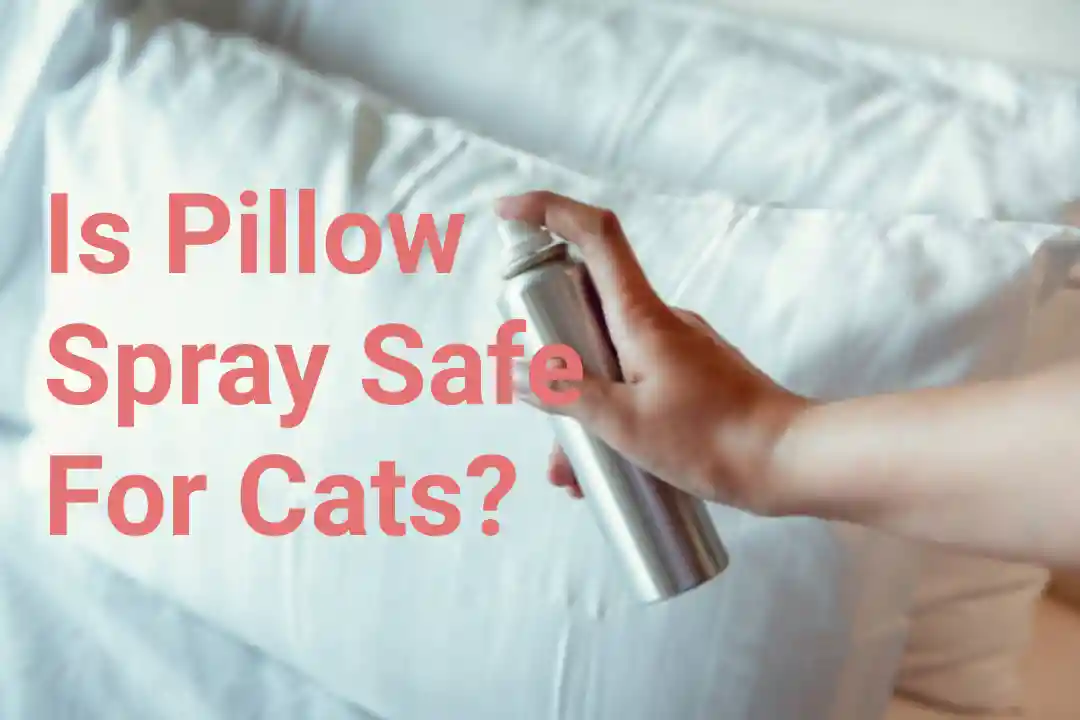Is Pillow Spray Safe For Cats? All You Need To Know

Is pillow spray safe for cats? There are a lot of benefits that come with using pillow spray. Not only does it help you relax, but it also has a calming effect on your mind and body. It is also believed to help you sleep better. However, can the same be said of cats? Is this pillow spray safe for our feline friends? You’ll find out shortly.
Table of Contents
- What is Pillow Sprays
- Common components of pillow sprays
- Are pillow sprays safe for cats
- Dangers of using Pillow Sprays for cats
- Alternatives to Pillow Sprays
- Final Thoughts
What is Pillow Sprays
Pillow sprays are a form of aromatherapy that uses the power of scents to help you relax and drift off to sleep. Generally, these sprays contain essential oils like lavender, chamomile, and ylang-ylang, all of which are known to have soothing properties.
When used in a pillow spray, the essential oils are blended with a base of water, which helps to disperse the scent and disperse it evenly throughout the pillow. The sprays are typically used on both sides of the pillow and can be sprayed directly on the pillow or sprayed into the air around the bed. The scent can then be inhaled and absorbed through the skin.
When appropriately used, pillow sprays can help to create a calming atmosphere in the bedroom and can even help to reduce stress and anxiety. This makes it an excellent solution for those who have insomnia, as well as those who want to relax and get a good night’s rest.
Pillow sprays are easy to use and are readily available in most health stores, as well as online. They are also typically very affordable, so they are an excellent solution for those looking to get a good night’s sleep without breaking the bank.
Read: Dr Teal’s pillow spray, are they safe for cats?
Common components of pillow sprays
A large body of research exists on the herbal components commonly found in sprays. The following ingredients may have benefits for better rest:
Lavender
Start down the pillow spray path, and it won’t be long before you encounter lavender.
Among [pillow spray] components, lavender is perhaps the ingredient that has been studied the most and shown to be associated with favorable sleep outcomes,” says Robbins.
A 2012 review that evaluated eight studies concluded that lavender oil might have a small-to-moderate benefit for inducing sleep.
Another 2015 study found that people who practiced good sleep hygiene and wore a patch filled with lavender essential oil at night had better sleep quality than those who only practiced healthy sleep hygiene.
Chamomile
You might be familiar with drinking chamomile as a soothing ingredient in tea, but how about inhaling it?
The research on chamomile oil’s dreamy effects isn’t as robust as that of lavender, but it may deserve an evidence-based place on your pillow.
Valerian
Another standard addition to many pillow sprays is valerian. This root of a perennial flower native to Europe and Asia has been used as a sleep aid since the 1700s.
Strong evidence points to valerian as a safe and effective herbal remedy for better shut-eye. 60 studies determined that this humble plant had therapeutic benefits for sleep when taken internally as a tincture in water or alcohol, including:
- reducing anxiety
- shortening the time it takes to fall asleep
- improving overall sleep quality
Vetiver
Vetiver is a key ingredient in the best-selling commercially made pillow spray Thisworks. But does it work?
Despite ThisWorks’ claims that vetiver “settles nerves and establishes a feeling of balance,” the evidence for these benefits in humans is lacking. Still, animal research has shown some promise.
Bergamot
Similar to chamomile, bergamot is used in both essential oils and drinkable teas. It’s the ingredient that gives Earl Grey tea its signature flavor.
While a big cup of caffeinated black tea might not help you unwind, bergamot oil does appear to have relaxing properties.
In a 2015 survey, participants were given an inhaler filled with essential oils, one of which contained bergamot and sandalwood. Sixty-four percent of the participants reported an improvement in sleep quality.
Read: Lavender pillow sprays, are they safe for cats?
Are pillow sprays safe for cats
Are you worried about your feline friend snuggling up to your pillow after you’ve sprayed it with a pillow spray? It’s a valid concern, as many of these sprays contain essential oils that can be toxic to cats.
Most cats love to curl up in a cozy spot for a nap, and many humans enjoy spritzing a pillow spray or air freshener to make their beds smell nice. However, if you have a cat, it’s essential to be aware that some of the ingredients in these products can be toxic to cats.
Essential oils can be especially hazardous for cats, as their livers cannot process the toxins in these oils. Depending on the type of essential oil in the pillow spray, cats can experience various symptoms ranging from vomiting and diarrhea to seizures and even death.
The good news is that there are pet-safe pillow sprays available that are specifically formulated to be safe for cats. These sprays contain natural ingredients such as lavender, chamomile, and lemon that are not only safe for cats but also help to relax your furry friend and create a pleasant scent in your bedroom.
When choosing a pet-safe pillow spray, make sure to check the label for any essential oils and avoid sprays that contain them. It’s also a good idea to keep the spray out of reach of your cat, as even pet-safe sprays can irritate their delicate noses.
Dangers of using Pillow Sprays for cats
According to the American Society for the Prevention of Cruelty to Animals, cats are especially sensitive to essential oils.
“Effects such as gastrointestinal upset, central nervous system depression, and even liver damage could occur if ingested in significant quantities. Inhalation of the oils could lead to aspiration pneumonia,” reads the organization’s website. “There are significant variations in toxicity among specific oils. Based on this, we would not recommend using essential oils in areas where your pets have access unless pets are supervised or your veterinarian approves the use of the oil.” Pet parents are instead advised to use diffusers instead with a strong caveat.
Alternatives to Pillow Sprays
Some cats are naturally stressed and anxious as part of their demeanor, while others save their freak-outs for car trips and vet visits. This leaves many pet owners wondering how to calm a cat to give them a little stress relief in any situation. Fortunately, effective remedies and alternatives other than pillow sprays are available that are both natural and easy to administer. Try these herbs and flower essences to help calm down your cat. These include :
Catnip
Why give a substance known to rile up Fluffy to try and calm her down instead? The key to using catnip for relaxing your kitty is to give it to her about 15 minutes before a stressful event, such as the dreaded veterinary trip. After she hangs from the ceiling and bolts around the room at lightning speed, she will be worn out and exceptionally calm.
Bach Rescue Remedy
Humans have known the benefits of this flower essence combination in relieving stress and anxiety, and, fortunately, it can also be used with cats. Though technically not an herb, its reliable benefits bear a mention in any list of stress-reducing tactics. Perhaps the best feature of Bach Rescue Remedy is its immediate effectiveness. This formulation is excellent when you need to calm down your cat pronto. Be sure to purchase the alcohol-free version for Fluffy.
Chamomile
Many people drink chamomile tea before bed to help them relax, and the same anti-anxiety properties are just as effective for cats. However, dried flowers are a better way to expose your cat to its stress relief benefits.
Studies in animals have shown that chamomile contains substances that act on the same parts of the brain and nervous system as anti-anxiety drugs. The effect promotes relaxation and reduces stress.
Final Thoughts
While pillow sprays are an excellent option for humans, the same can’t be attributed to our feline friends despite their strong sense of smell. These pillow sprays, as examined, contains essential oil such as Lavender which can be harmful to cats, especially when in high concentration.
If this spray must be used, it is essential to use a significantly diluted solution and products with unique formulations for cats, as cats have a much higher sense of smell than humans and can be easily overwhelmed by even a tiny amount of oil.



